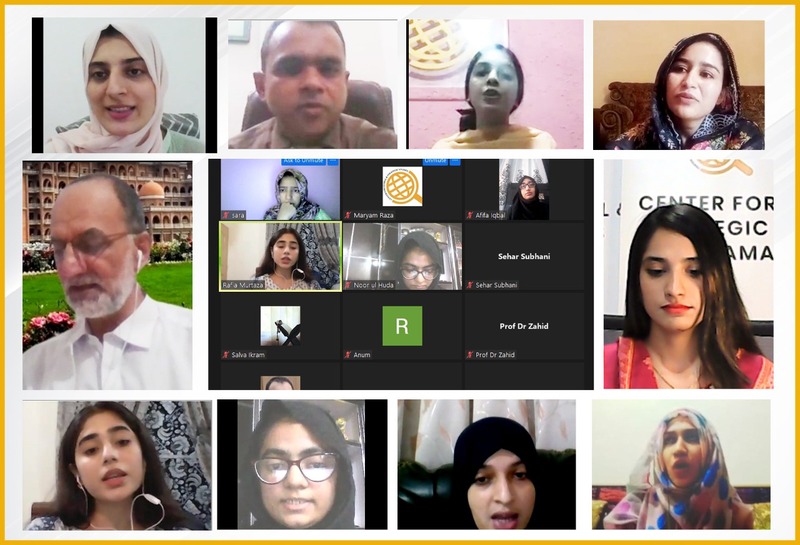
4th September 2021
Headlines: On 4th September 2021, Young scholars’ debate on 70 Years of Pak-China Diplomatic Relations was organized by Pakistan Research Center for a Community with Shared Future, Communication University China (CUC), Beijing, China. Young analysts and researchers shared their analysis on different themes. Prof Dr. Zahid Anwar, Director, China Study Center, and Dean Faculty of Social Sciences, University of Peshawar supervised the debate session and also shared his expert knowledge on Pakistan and China friendship.
The main themes discussed in the debate were analyzing Pak-China 70 years of exceptional partnership, dialogue of civilization, building a community with shared future, prospects for academic cooperation between China and Pakistan, Significance of China’s BRI, Role of SCO in mitigating common challenges, and inclusive economic partnership under CPEC.
Different analysts and researchers shared their views, highlighting strong historic relations between China and Pakistan. The students discussed that Pakistan considers China one of the closest partners, and China termed the relationship with Pakistan as Iron Brothers.Both countries have shared weal and woe, established an all-weather friendship and carried out all-round cooperation since the establishment of diplomatic relations. In the past 70 years, both nations developed strong relationship that is also visible at many international platforms.
One of the young scholars discussed the role of Shanghai Cooperation Organization (SCO) in mitigating common challenges. The significance of SCO as a multilateral platform was discussed. Students were in a view that through such institutions, China has provided a great platform to all countries to resolve common issues. The platform holds great relevance for Pakistan.
While discussing the benefits associated with China’s Belt & Road Initiative (BRI), one researcher discussed that developing and under developing countries are experiencing dynamic socio-economic changes through BRI infrastructure development. The economic dividends of all six corridors of BRI were also discussed. One researcher discussed that CPEC is one of the most significant, biggest and far-reaching initiative for both nations in the history of their mutual relationships. It is fruitfully accounting in the future prospects for open market development, building mutual trust, economic integration, and fostering cultural ties between both states.
Young analysts also discussed the grand narratives, i.e., community with a shared future and dialogue of civilizations as aligning visions by His Excellency, President Xi Jinping. They explained that academic cooperation under such narratives would enhance people-to-people cooperation between China and Pakistan, provide opportunities to students and increase cultural diplomacy. Young scholar also praised the policies of China under the visionary leader, President Xi Jinping.
In the productive debate, young students discussed that China has been increasing its global outreach through projects of inclusive economic developments and soft power diplomatic tools. The researchers also suggested that more opportunities must be provided to the students under cultural exchange program to learn about China and grand ideas like community with shared future.
Prof Dr. Zahid Anwar, Director, China Study Center, and Dean Faculty of Social Sciences, University of Peshawar supervised thedebate session. He shared his analysis on 70 years of historic diplomatic partnership between China and Pakistan. He stated that China is a great partner of Pakistan and has been assisting in many domains.
He commented on the all the discussants of the debate, pointed out their strengths and also provided with his expert suggestions. Prof. Dr. Zahid appreciated the initiative of CGSS and Pakistan Research Center for a community with shared future to organize the young student debate which was the dire need of time. He encouraged the students to continue with their research on BRI, CPEC, and grand narratives, i.e., dialogue of civilizations and enhance their analytical skills.
The debate program was moderated by Ms. Maryam Raza, Deputy Director, Pakistan Research Center for a Community with Shared Future, Communication University China (CUC), Beijing, China. It was attended by 30 participants and was viewed live on various social media platforms as well. It is noteworthy that researchers, analysts and students from all across Pakistan participated in this online young scholar debate.
Following young scholars of various universities participated:
i. Ms. Afifa Iqbal, University of Punjab, Lahore
ii. Ms. Aleezah Dreshak, Kinnaird College for Women, Lahore
iii. Ms. Sehar Subhani, National University of Modern Languages, Islamabad
iv. Ms. Hafiza Noor ul Huda, Lahore College for Women, University
v. Ms. Anum Shahid, University of Karachi
vi. Mr. Rana Pervaiz Iqbal, the Islamia University of Bahawalpur
vii. Ms. Rafia Murtaza, Lahore college for Women University
viii. Ms. Summaya Khan, Bahria University, Islamabad
ix. Ms. Salva Ikram, University of Management and Technology, Lahore
